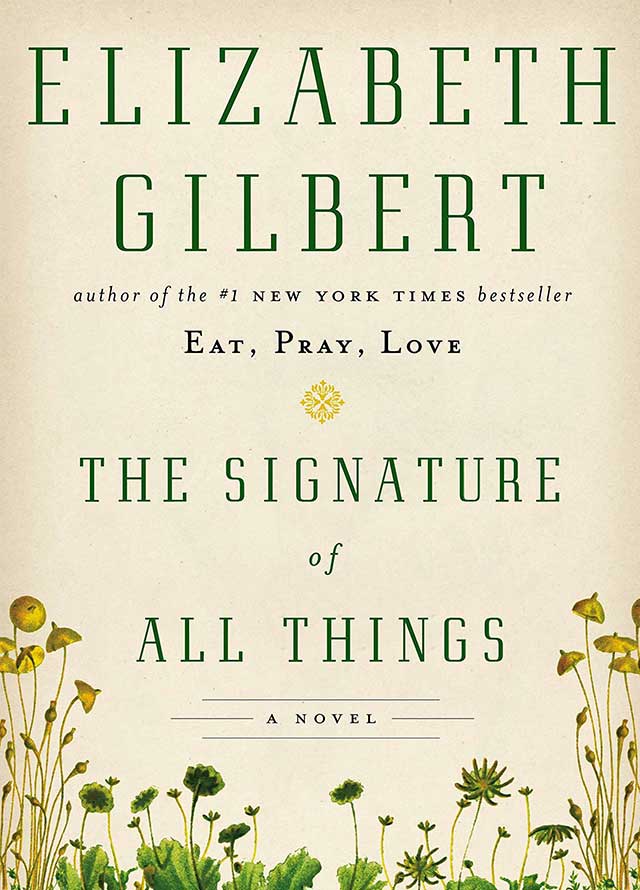
I am a reader and a writer in the contemporary, yet I am a reader and a writer of the past. And literature based on old centuries propels me to read it and especially if it’s historic fiction. Inspired by ground breaking experiences, incandescent emotions, and an industrious century of revolutions, The Signature Of All Things is a masterpiece that stretches to charm us with the best of both worlds of fiction and non- fiction. Elizebeth Gilbert has more likely swayed her wand of storytelling than just merely writing. It’s a long novel stuffed with history and exceptionally well-narrated characters. Elizebeth Gilbert is a big name in today’s writing world. With previous successful novels such as Eat, Pray, Love and Committed, Ms. Gilbert gifted the world another epitome of her writing artistry. The novel was also long listed for the prestigious Bailey’s Women’s Prize for Fiction.
Alma Whittaker is the only biological child of the famous millionaire Henry Whittaker and his strong stringent Dutch wife Beatrix Whittaker. Her father has a rich history of achieving a stature amongst the eminent botanist businessmen of Philadelphia. Alma has luxuries and a library of endless knowledge, yet unlike her adopted sister Prudence, she lacks true feminine beauty. Often at tables, Alma is the one involved in knowledgeable debating while Prudence is the real apple of every man’s eye. Our protagonist is heavily into botanical studies just like her father and occupies herself in plants and taxonomy.
Beatrix does her best to ensure that both her children remain safe from any content of vulgarity and adultery but once after discovering a French sensual novel, Alma is coaxed to sway into pleasures and desires. Even the publisher Mr. George Hawkes, to whom Alma had no intimacy, was being seen and observed by her as a suitable partner. She soon starts to fall for Mr. George Hawkes while he often visits Alma for publishing her botanical articles.
Retta Snow, a girl of unusual character becomes friends with Alma and Prudence. Alma confesses her love for Mr. George to Prudence more than once even though she fails to marry him for George Hawkes asks for Retta Snow’s hand while Prudence marries their tutor Mr. Dixon right after the death of Beatrix Whittaker. Heartbroken Alma spends many of her years continuing her research and study of plants (mosses specifically) until one day she meets Ambrose Pike, an exceptional artist with a mysterious attitude and beliefs. Ambrose believes in “the signature of everything”, that everything God has created signifies or manifests a feat of us and this universe.
Even though Ambrose is an idealist while Alma is a complete realist, what they share in common is their thirst for knowledge, leading to their marriage, which fails soon after Alma realises that her husband bores no physical attraction towards his much older wife. She soon sends Ambrose out to the Tahiti islands to study mosses. Alma soon becomes a victim of inferiority complex as she receives no letters from her man (except for the one notifying Alma of his death). Alma becomes despondently devastated that despite being an intellect, she has miserably failed in her personal life which she shall spend as a spinster until Captain Dick Yancey brings Ambrose Valise to Alma with obscene photos with “Tomorrow Morning” written at the back which enrages Alma who concludes that Ambrose was a homosexual. Retta Snow has been living as a mental patient while her house mistress Hennecke De Groot reveals to her that Prudence sacrificed her life by marrying her tutor and living in destitute and as an abolitionist. Yet she decides to not end her sacrifice in vain and offers Prudence her entire mansion.
 Ms. Gilbert has extensively worked on the characters’ background. Some of them are real while some are not. The botanical words used in this novella made me think that the authoress is a botanist herself. How Alma discovers her feelings with the mosses is incredible. Psychological concepts discussed in the book are commendable. The writer has done everything to display to the audience a brief glimpse of the industrious 19th century. One can witness the subjects of woman empowerment and slavery in the book. Henry Whittaker’s history is so rich that one might forget that this book is about Alma Whittaker and not her father.
Ms. Gilbert has extensively worked on the characters’ background. Some of them are real while some are not. The botanical words used in this novella made me think that the authoress is a botanist herself. How Alma discovers her feelings with the mosses is incredible. Psychological concepts discussed in the book are commendable. The writer has done everything to display to the audience a brief glimpse of the industrious 19th century. One can witness the subjects of woman empowerment and slavery in the book. Henry Whittaker’s history is so rich that one might forget that this book is about Alma Whittaker and not her father.
I can feel different writers’ shades impeccably implied in this novella. It’s like Elizebeth Gilbert once became Oscar Wilde while writing Ambrose, once became Jane Austen while describing Alma, became Robert Louis Stevenson while describing Tahiti adventures, and even once became Charles Dickens while narrating Henry Whittaker. Indeed, a manifestation of a true writing prodigy. Hats off to Ms. Gilbert!
Alma travels to Tahiti to find the man in the picture. She encounters new characters, learns Tahitian mythology, their culture, and their brutal sports but fails to find that man; then one day he appears as a missionary arriving from a mission to spread Christianity. “Tomorrow Morning” appears to be his nickname and he is revered and doted by everyone on the island. Once he and Alma visit a place where she discovers a rare shimmering moss. She discovers that Ambrose did not die of infection (as told) but of grief and he had mentioned her a lot during his stay on the island.
Alma Whittaker visits Holland and gets employed by his uncle, later deriving a revolutionary theory about moss which gets recognized by Botanist Fraternity, she finally finds solace and gratitude in her new life and believes she can now depart in peace.
The entire story is exceptionally gripping from page one. It’s a massive tale of love, adventure, and emotions. Probably the biggest one I’ve ever read. I think a separate book on Henry Whittaker should also be made as I pretty much gushed over his history as well. Overall, the book is literally a gem of the modern literature world. I would surely recommend it to anyone out there seeking adventures and history amidst the perfumed cogent pages of a novel.
Review: Shargeel Sheikh![]()











































